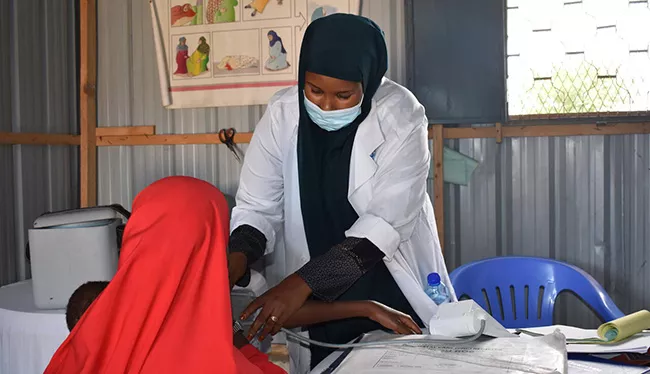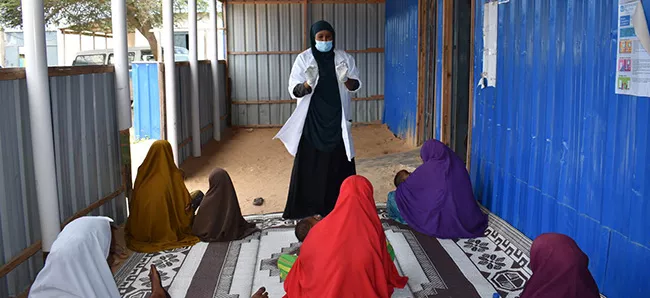“Women of SOS”: Halima Ahmed Dalel, Maternal Health Nurse, SOS Somalia
To mark International Women’s Day on 8 March 2022, we are sharing a 5-part series featuring professional and empowered “Women of SOS”. The Women of SOS are leaders and change-makers. They demonstrate the diversity of SOS programming around the world, and all that it takes to protect and care for children, strengthen families, empower communities, and provide emergency response.
Today, the spotlight is on Halima Ahmed Dalel, Maternal Health Nurse with SOS Children’s Villages Mother and Child Clinic in Somalia since 2015. In this role, Halima tends to the internally displaced women and children who reside in the 10 large IDP camps surrounding the clinic. In this interview, Halima shares her experiences, her challenges, her love of the work, and her vision of a gender-equal world.
What was life like for you in Somalia as a young girl?
Somalia is a country which has faced many obstacles, such as the civil war which destroyed thousands of homes and killed so many innocent people. The education system collapsed along with other governmental services and facilities.
So, at a young age, my parents gave me hope in life and wanted me to get the best in life. They did this because they did not get that same opportunity, and they wanted me to be strong.
My mother was a housewife and my father owned a machinery spare part shop which provided steady income and supported our family.

Please share your educational journey.
I studied from preschool to university in Mogadishu, Somalia’s capital. During my school times, the roads were often blocked and militia fights used to take place sometimes. At a tender age, I encountered and witnessed some incidents which were out of my control. It was indeed a hard time.
However, throughout my education, my parents were my all-time supporters and through them, I was resilient enough to cope with the situations going on around us.
First, I earned a diploma in SOS Community Nursing School, after that I completed a one-year degree in Nursing. I have always known that this work – tending to patients – was what called me.
Where did you work before you joined SOS Somalia?
Before I joined SOS Somalia, I worked in a private hospital in Mogadishu for 2 years as a midwife. I worked with international doctors (Indian, Kenyan, and Arab doctors). This was a private institution, so the equipment was advanced. It was a good learning experience for me.
But when I saw a vacancy for a Nurse with SOS Children’s Villages Somalia, I applied right away. I’ve always wanted to make a difference in my communities’ life, especially for women and children.
Please describe a typical day in your work.
Women and children living in the IDP community are at the heart of what I do. These families have lost everything and have come to seek refuge from floods, drought or conflict. They are vulnerable, impoverished and they need healthcare. I aim to work until every child and mother is healthy. I am a mother of one child and I see her in the 15 plus children I touch every day. It is my duty and responsibility to alleviate their pain as much as I can.

My work comes in different shapes and forms. For example, I receive calls to support mothers delivering in their IDP homes, and who cannot reach the health facility because of extensive bleeding. The situation can be life threatening to both the baby and the mother. At times, I ask a doctor from the clinic to accompany me to ensure quality care in this delicate situation. I then personally follow up with these cases until the mother and child are stable.
I distribute delivery kits to expectant mothers in the camp to avoid such emergency situations. In the kit is a plastic bag, towel, and oil for the baby, disinfectant for the mother, two pairs of gloves, a razor blade and cod clam for the umbilical cord. With these items, the mother can safely give birth to her baby at home with help from any available health worker.
I also counsel mothers and women experiencing violent relationships at home. A husband will beat his wife for visiting the health centre without his approval. The woman comes to me with bruises on her face. I calm her down and listen attentively to her grievances. I refer tough situations to a local organization dealing with gender-based violence where women receive legal redress and more counselling.
What are your daily challenges in this role?
I have worked in this position for more than 7 years now, so I have adapted to many challenges faced in my work. For example, when there is a crisis in the country (famine, floods, war), I know the hospital usually gets overcrowded with beneficiaries coming from the outskirt of Mogadishu. To meet the needs of everyone, we do referrals to other nearby organizations who can provide additional support like food vouchers and livelihood incomes.
There are also some other challenges. For example, I sometimes receive threats from husbands who do not approve their wives need for medical assistance. So, I take time to explain to them the importance of health and nutrition to the mother and the baby. After a long explanation, they agree that she continues with treatment. Not all husbands behave like that though, only some from the rural areas who have never seen or accessed a health facility.
What keeps you motivated to continue?
I am motivated because I know how acutely the services of the Mother and Child Clinic are needed by the community. At the end of the day, I know that these services are reaching people in need, and that mothers and children living in the camps are receiving quality health care.
I am also satisfied working in this hard conditioned IDP settlement because I learn new ways of handling crisis and emergency cases all the time. There is no better reward than seeing the results of my work from directly helping people in dire need of assistance.
Overall, I am satisfied and motivated when I see sick children gain strength and healthy mothers taking care of their children, even under very tough conditions. I am strong for the families I work with.

Please share a fond memory, or the best day you’ve had in this role.
I recall a young mother who came to the health centre with a sick child suffering from malnutrition. The mother was heavily pregnant, and she was experiencing hardship in the family because of poverty. The child had other complications like vomiting, diarrhoea, and high temperature. I referred the case to another medical facility where the child was admitted and quickly received proper medication and nutrition supplements.
This type of chain of response makes me very happy. My goal is to safeguard and preserve the life of every child in my care.
What are the key challenges you see for girls and women in Somalia?
There are several. First, most of the females in Somalia are under-educated. Unfortunately, they are highly discouraged from education by their family members, even though there are campaigns on improving the education of girls in Somalia supported by nongovernmental organizations.
Young girls in Somalia are forced to marriage at a younger age, and this has an impact on their health. If the young girl gets pregnant and does not receive quality health care, there is a high rate of maternal morbidity and mortality. Too many young mothers bleed to death due to pregnancy complications.
Women are the most vulnerable creatures when it comes to droughts, famine, flood, and wars. It has a negative impact on them particularly if they are left on their own to raise children alone. Most women are poor and live below poverty line and cannot afford the basic needs.
Women and male are not considered the same in job opportunities, most companies are male dominated.
What does a “gender-equal” world look like, to you?
In today’s world, there is injustice and people do not receive the same rights. In a gender-equal world, men and women would have equal rights to the necessities of life, and they would participate in decisions that affect their lives without discrimination.
_______________
About SOS Children’s Villages Somalia: SOS Children’s Villages Somalia was established in 1985 and is a member of the SOS Children’s Villages federation. SOS Somalia has over 37 years experience in the provision of longer-term alternative care, youth programming, family strengthening, and direct delivery of humanitarian assistance. SOS Somalia's Mother and Child Hospital was established in Mogadishu in 1991, at the brink of civil war. The Hospital caters to the health care needs of thousands of vulnerable mothers and children and accords the highest standards of medical care to all its patients indiscriminately. Since its inception, the hospital has been acclaimed for excellence in clinical care service in Mogadishu and continues to register tremendous growth and change.
